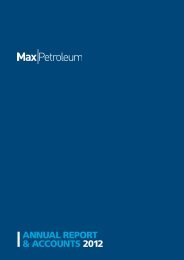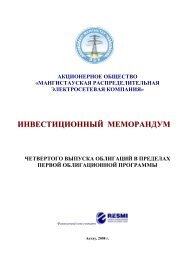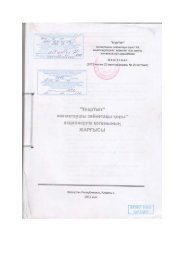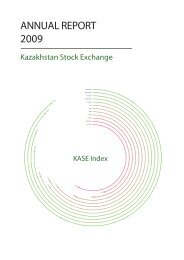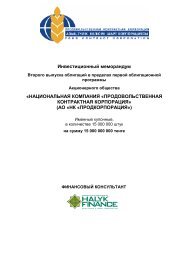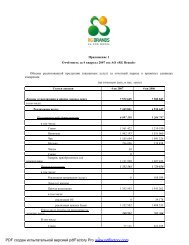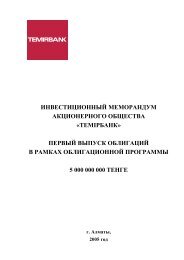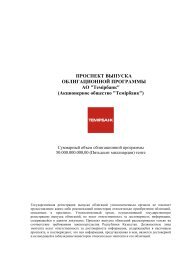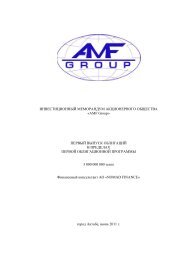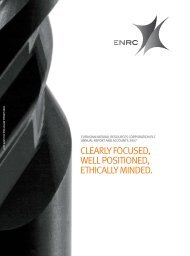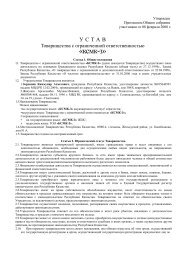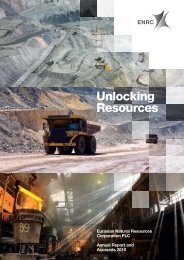JPMorgan - KASE
JPMorgan - KASE
JPMorgan - KASE
You also want an ePaper? Increase the reach of your titles
YUMPU automatically turns print PDFs into web optimized ePapers that Google loves.
construction of the plant, anticipated to be approximately $32.0 million, will be shared with<br />
Turgai Petroleum. It is intended that the plant will provide stable electrical power for field<br />
operations and will provide excess electricity for sale to Kyzylorda city and a credit for Shymkent<br />
refinery power usage. The plant is due to be commissioned in the third quarter of 2003. In<br />
addition, as a joint venture partner in Kazgermunai LLP, or Kazgermunai, we are participating in<br />
a project to provide natural gas to the Kyzylorda region. The feasibility of this project is under<br />
consideration, but funds have been budgeted in 2003 for its construction. We cannot assure you<br />
that our gas utilization program will not require a larger investment than we currently expect,<br />
which could have a material adverse effect on our results of operations. Either of these<br />
operations could raise additional issues under environmental laws and require us to expend<br />
funds to bring such operations into compliance.<br />
Further, we may be subject to environmental liability as a result of our acquisitions. We acquired<br />
the Shymkent refinery in 2000 on an ‘‘as is’’ basis, with limited representations and warranties.<br />
Our ownership and operation of the Shymkent refinery may subject us in the future to risks of<br />
substantial liability, including liability for environmental matters arising from events occurring<br />
prior to its acquisition. We cannot assure you that material matters, not identified or fully<br />
investigated during our due diligence investigation, will not subsequently be identified, that<br />
matters identified will not prove to be more significant than currently expected, or that the<br />
indemnification provisions in the HOP transaction agreement will be sufficient to compensate us<br />
for any future environmental losses or other future losses.<br />
Our operations in Kazakhstan are subject to periodic inspection by government environmental<br />
protection agencies. Those inspections have resulted in the receipt of formal communications<br />
from the governmental authorities detailing our noncompliance with specified environmental<br />
regulations and requiring corrective actions. However, we are unable to predict what action may<br />
be taken by those agencies or the Kazakhstani government as a result of the cited violations. Any<br />
action could have a material adverse effect on our business, financial condition and results of<br />
operations.<br />
Further, under Kazakhstani privatisation laws, the HKM privatisation agreement and the HOP<br />
privatisation agreement, the Kazakhstani government is required to assume the financial<br />
responsibility for environmental damages which occurred on our property before we acquired<br />
HKM and HOP. In order to allocate this responsibility, we must agree with the Kazakhstani<br />
government on a baseline for the environmental damages that occurred before the<br />
privatisations. We hired a consultant in 1997 to perform a baseline study of environmental<br />
damage to the HKM properties. The Kazakhstani government has reviewed and approved the<br />
results of this assessment. To date, no baseline has been definitively established for the<br />
environmental damages on the properties of HOP. We cannot assure you that we will be able to<br />
agree with the Kazakhstani government on a satisfactory baseline for pre-privatisation<br />
environmental damages. If the Kazakhstani government does not fully assume the financial<br />
responsibility for pre-privatisation environmental damages because no baseline was set or the<br />
baseline does not fully cover those damages, our business, financial condition and results of<br />
operations could be adversely affected.<br />
We could incur significant liability for discharges into the environment or environmental damage<br />
caused by noncompliance with environmental laws or regulations. That liability could have a<br />
material adverse effect on our results of operations. Moreover, we cannot predict what<br />
environmental legislation or regulations will be enacted in the future or how existing or future<br />
laws or regulations will be administered or enforced. In the future, our compliance with more<br />
stringent laws or regulations, or more vigorous enforcement policies of any regulatory agency,<br />
could require material expenditures by us for the installation and operations of systems and<br />
equipment for remedial measures, any or all of which could have a material adverse effect on<br />
our results of operations.<br />
For a detailed discussion of our environmental matters, see the section entitled “Business and<br />
Properties — Environmental Matters”.<br />
15



